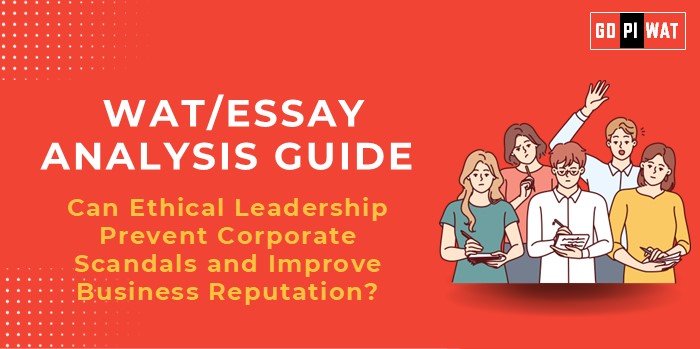📋 WAT/Essay Analysis Guide: Can Ethical Leadership Prevent Corporate Scandals and Improve Business Reputation?
🌐 Understanding Ethical Leadership’s Importance
Ethical leadership prevents corporate scandals by fostering integrity, accountability, and transparency. For B-schools, the topic connects deeply to leadership frameworks, CSR, and governance challenges that managers face today.
📝 Effective Planning and Writing
- ⏳ Time Allocation:
- 🗂️ Planning: 5 minutes
- ✍️ Writing: 20 minutes
- 🔍 Review: 5 minutes
- 💡 Preparation Tips: Gather key case studies, leadership frameworks, and statistics to substantiate arguments.
✨ Introduction Techniques for Essays
- 🔄 Contrast Approach: “While ethical leadership builds trust, the collapse of companies like Enron and Volkswagen highlights the devastating cost of unethical practices.”
- 💡 Solution-Based Start: “In an era of corporate fraud, ethical leadership emerges as a strategic solution to rebuild trust and prevent scandals.”
📚 Structuring the Essay Body
🌟 Achievements of Ethical Leadership:
- 🤝 Builds Trust: Enhances consumer trust and investor confidence (e.g., Tata Group’s enduring reputation).
- 🔐 Reduces Risk: Minimizes financial penalties and lawsuits.
- 🌱 Sustainability: Promotes long-term profitability through ethical and sustainable practices.
⚠️ Challenges and Comparative Analysis:
- 📉 Short-Term Pressures: Leadership under pressure for immediate profits compromises ethics.
- 🏢 Case Study: Volkswagen’s emissions fraud caused €30 billion in losses and damaged trust.
- 🌍 Global Comparison: USA’s SOX Act vs India’s SEBI reforms post-Satyam scandal.
📊 Future Outlook:
- 🛠️ AI-Driven Ethics Monitoring: Leverage AI tools for real-time accountability.
- 📜 Strengthening Standards: Establish global frameworks for leadership integrity.
📄 Concluding Effectively
- ⚖️ Balanced Perspective: “Ethical leadership alone cannot prevent scandals, but when paired with strong governance frameworks, it builds an ecosystem of accountability and trust.”
- 🌐 Global Comparison: “By learning from global failures and successes—such as SOX in the USA and SEBI reforms in India—ethical leadership can guide businesses toward sustained growth and reputation.”
📊 Analyzing Successes and Shortcomings
- 🏅 Achievements: Prevents fraud, builds trust, and fosters accountability.
- ⚠️ Challenges: Integrity gaps in leadership, and pressure for short-term profits.
- 🌍 Global Context: Lessons from Enron, Volkswagen, and Indian benchmarks like Tata Group.
🔑 Recommendations for Sustainable Progress
- 📚 Leadership Training: Strengthen ethics and governance in leadership development programs.
- 💻 Technology Integration: Implement monitoring tools for fraud detection and compliance.
- 🌐 Global Collaboration: Adopt and align with international best practices for ethical governance.
📝 Sample Short Essays
⚖️ Balanced Perspective:
“While ethical leadership builds trust and accountability, its success depends on robust governance mechanisms. Scandals like Volkswagen’s emissions fraud highlight the need for systemic reforms alongside leadership ethics.”
💡 Solution-Oriented:
“Ethical leadership, when paired with technology-driven fraud monitoring and strong regulations, can prevent corporate scandals. Companies like Tata Group demonstrate the transformative impact of value-driven leadership.”
🌍 Global Comparison:
“Ethical leadership frameworks, as seen with SOX Act reforms in the USA and SEBI norms in India post-Satyam, highlight the critical role of leadership integrity in preventing corporate failures and enhancing reputation.”


